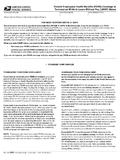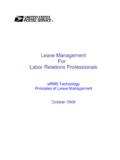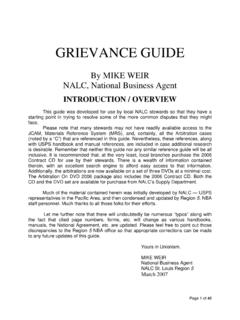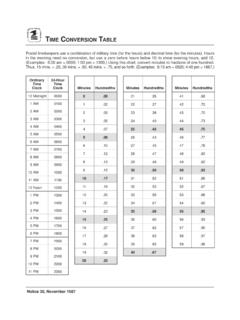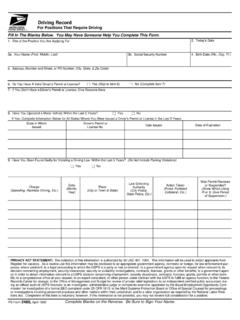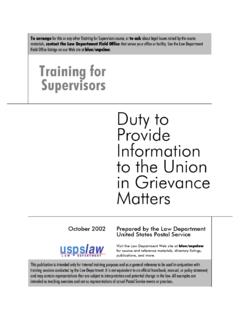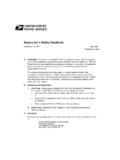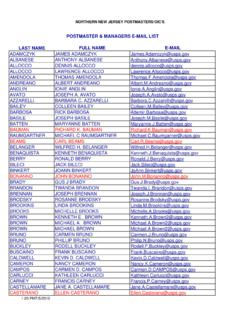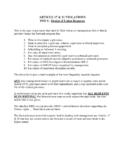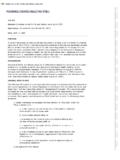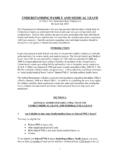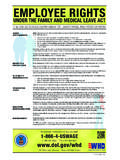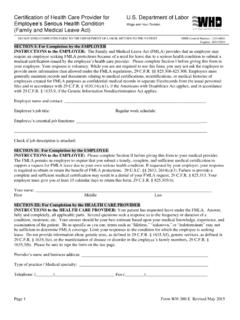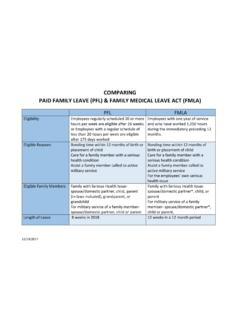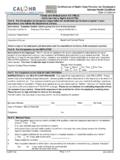Transcription of FAMILY & MEDICAL LEAVE ACT KEY POINTS
1 FAMILY & MEDICAL LEAVE ACT KEY POINTS The FAMILY & MEDICAL LEAVE Act is administered by the Department of Labor, Wage & Hour Division. ELIGIBILITY: To qualify for FMLA, the following conditions must be met; Employee has worked 12 months or 52 weeks for USPS (does not have to be consecutive) Employee must have worked at least 1250 hours during the previous 12 months ( LEAVE , even an absence covered by Workman s Compensation, does not count). Casual appointments can be used to qualify under the above criteria. ACCEPTABLE REASONS FOR USING FMLA; Employee s own serious health condition. Care of employee s child, spouse or parent with a serious health condition. Care for employee s newborn child up to age 1. For placement with employee of a child for adoption or foster care.
2 SERIOUS HEALTH CONDITION: Traumatic injuries (on or off-the-job). Incapacitating illnesses (self or FAMILY member) Chronic health condition. Pregnancy. QUALIFYING CRITERA FOR A SERIOUS HEALTH CONDITION: Overnight stay in a hospital, hospice, or residential MEDICAL care facility. Injury/illness lasting more than three (3) days with continuing treatment by a health care provider (the fourth day need not be consecutive). Pregnancy. Chronic condition. Long term or permanent disabling health condition. Conditions requiring multiple treatments to prevent period of incapacitation of more than three (3) consecutive days. DEFINITION OF CONTINUING MEDICAL TREATMENT: Either two or more visits to a health care provider, or One visit to a health care provider, with a regimen of continuing supervised treatment.
3 A) Therapy with special equipment or a MEDICAL prescription does qualify as continuing supervised treatment. b) Over-the-counter medications or instructions to drink fluids , exercise or rest do not qualify as continuing supervised treatment. The following minor illnesses do not qualify as serious health conditions under normal circumstances: Colds Routine dental or orthodontic work Ear aches Flu Headaches (Except migraines) Periodontal disease Minor ulcers Upset stomachs QUALIFYING CRITERIA FOR CHRONIC CONDITIONS: Continues for an extended time Requires periodic treatment Causes episodic periods of incapacitation Examples of chronic conditions: o Severe arthritis o Asthma o Back injuries requiring surgery or extensive therapy o Cancer o Colitis o Depression or stress related disorders o Diabetes o Epilepsy o Severe heart conditions o Migraine headaches o Recurrent kidney stones Examples of conditions requiring multiple periodic treatments.
4 O Physical therapy for carpal tunnel syndrome o Chemotherapy o Dialysis o Restorative surgery due to accident or injury QUALIFIED HEALTH CARE PROVIDERS: Physician Optometrist Osteopath Chiropractor (but for subluxation only) Podiatrist Dentist Clinical psychologist Nurse practitioner Nurse-midwives Christian Science practitioners Clinical social workers Any health care provider recognized by employee s health benefit program. MEDICAL CERTIFICATION REQUIREMENT: Requests for MEDICAL certification must be made directly to the employee; general postings are not sufficient. Certification requests must be made within two (2) days of the notice of absence.
5 Certification must contain the date that the condition began and the expected duration; The costs of complying with FMLA certification requests are paid by the employee. The employee must be given fifteen (15) days to obtain FMLA MEDICAL certification; longer time must be permitted if the employee can show reasonable diligence in attempting to obtain it. Postal officials (other than postal physicians) can not directly contact the employee s health care provider. Employer may request a second or third opinion, but must pay of it. Neither a second nor third opinion can be obtained from USPS physicians. If a third opinion is requested the physician is jointly selected by the employer and employee. Updated MEDICAL certification cannot be requested by the employer more frequently than every thirty (30) days, unless a significant change in the condition is evident or there is evidence of fraud QUALIFYING FAMILY MEMBERS: Sons and daughters Spouses Parents Relatives to whom you act in the role of a parent Relatives who acted in the role of your parent when you were a child A person acts in the role of a parent when he/she provides day-to-day care and financial support to the child.
6 Children over 18 only qualify as FAMILY members only if they are incapable of caring for themselves due to physical or mental disability Spouses must meet the definition of a spouse under state law in the state in which you reside. The standards for a serious health condition in a FAMILY member are the same as they are for an employee s own serious health condition. DEFINITION OF CARING FOR : The FAMILY member must be unable to provide for one of the following basic needs; o MEDICAL o Hygienic (such as changing MEDICAL dressings) o Nutritional (such as cooking meals) o Safety o Transportation (such as getting to MEDICAL appointments) A health care provider can certify the psychological benefit of the employee s presence with an incapacitated FAMILY member for qualifying under the law.
7 The fact that other FAMILY members may also be available to perform these tasks is irrelevant under the law. FMLA is not permitted for the care of minor children due to the incapacitation of the spouse; in such cases care must be for the spouse himself/herself. If both husband and wife work for the USPS, each is entitled to twelve (12) weeks of FMLA covered LEAVE to care for FAMILY members. The law does not mandate that intermittent LEAVE be granted following childbirth; only continuous LEAVE is covered. However, care for a newborn child (or a foster or adopted child) does not have to be taken immediately after birth. A father may take FMLA LEAVE for newborn care before the child s first birthday, even if the mother is also home. In the case of an adopted child, or one placed through a foster care program, the law covers the one year period beginning with the date of placement.
8 Foster care must be authorized by a public agency to qualify under FMLA. NOTIFICATION REQUIREMENTS: Thirty (30) days advance notice when possible Within two (2) days of first awareness when condition was unforeseen Diagnostic information may be kept private The employee must display a willingness to re-schedule planned MEDICAL treatment if it would unduly disrupt the Employer s operation; however, if re-scheduling is not possible, the LEAVE must be granted. Unforeseen absences may be reported in person, or by telephone, telegraph or fax (as soon as possible). The employee is not legally obligated to ask for FMLA in order to qualify; however, enough information must be provided to the Employer to give the indication that FMLA applies to the specific circumstances.
9 Someone other than the ill/injured employee can provide the notice. In the event that the nature of the condition is determined later than the reporting date, it is sufficient notice for the employee to give the information to the Employer upon learning of it (this would include situations where an initial diagnosis is later changed). The Employer must continue health benefits coverage as if the employee was working; however, the employee is responsible to continue paying his/her share of the total premium. If the employee fails to pay his/her share, coverage can be cancelled. However, upon return to duty, the law requires that the health benefit coverage be reinstated. If the Employer offers the employee a reduce schedule or light duty work in lieu of FMLA; the employee is not obligated to accept such work while the 12 week entitlement is still not completed LEAVE can not be denied if the employee refuses the light duty and/or reduced schedule Discipline can not be issued for refusing such assignments OWCP benefits could be jeopardized by refusing, however, if the injury was sustained on-the job.
10 Paid LEAVE on the employee s LEAVE balance can be used during FMLA absences (sick LEAVE requests must comply with contractual requirements for sick LEAVE or sick LEAVE for dependant care). RETURN TO DUY FOLLOWING FMLA COVERED ABSENCE: Employee must be restored to his/her former position. Employer obligations are; Posters; if posters are not in place, the employee s advance notice obligations are waived FMLA must be incorporated into official Handbooks or benefit documents Where an employee is ineligible for FMLA, the Employer must notify him/her by the start of the LEAVE or within two (2) business days Where an employee is eligible for FMLA, the Employer must notify him/her of their rights and responsibilities under the law When LEAVE has been designated as FMLA LEAVE , the employee must be notified in writing (revised PS Form 3971 s include notification boxes) ENFORCEMENT.
